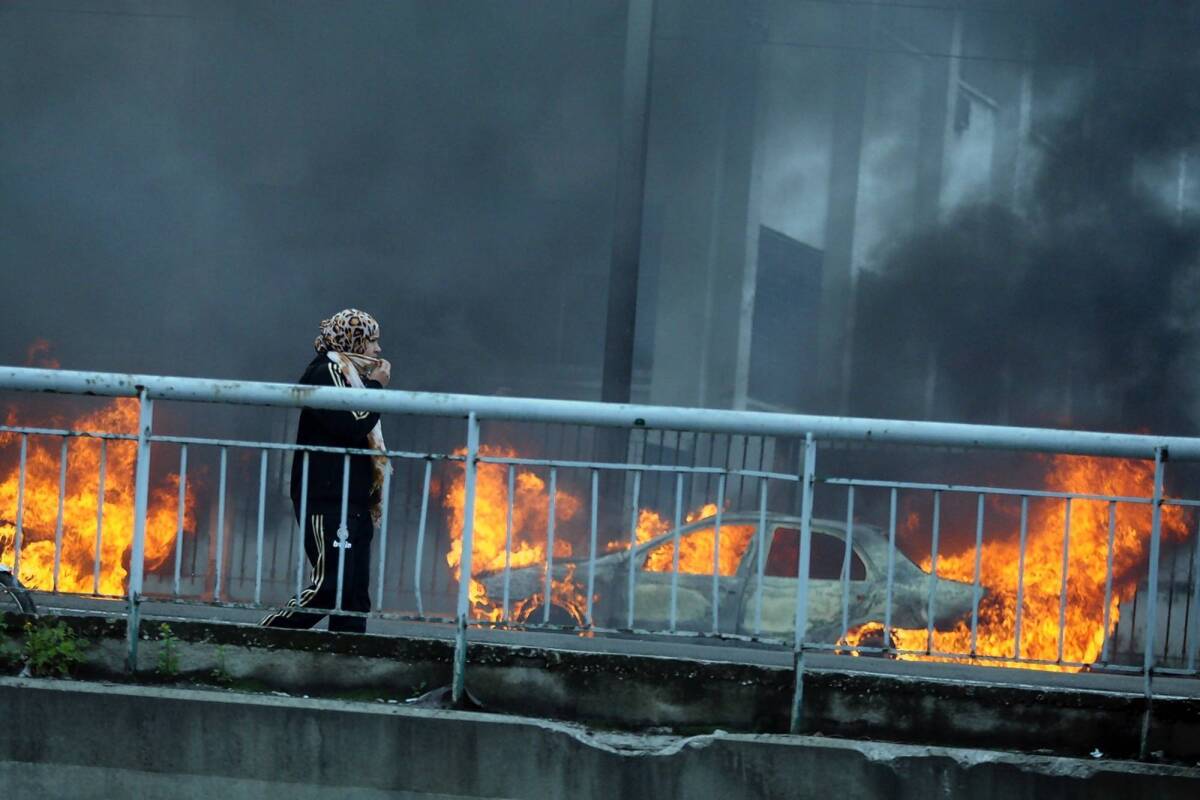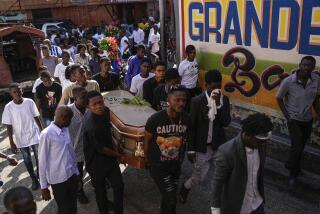Tunisia unrest persists as funeral is held for slain politician

- Share via
TUNIS, Tunisia — The slain Tunisian opposition leader’s coffin was driven through rain-swept streets lined with soldiers and crammed with mourners who chanted against the Islamist-led government and marched with placards through the heart of this troubled capital.
Chokri Belaid’s funeral procession moved slowly through neighborhoods Friday while his compatriots clashed with police and demonstrated by the tens of thousands on the third day of unrest that has sharpened political divisions in the birthplace of the “Arab Spring.”
The assassination of Belaid, a fiery leftist who was shot Wednesday, roused this economically beleaguered nation and ignited fresh furor by secular liberals against the dominant Islamist party, Nahda. Tunisia had been a model for countries emerging from a region in upheaval, but rising radical Islamist voices have chilled its transition to democracy.
Mourners in Tunis swelled through streets and boulevards, singing the national anthem. Youths hurled stones at police near the Interior Ministry, and security forces fired tear gas around the funeral procession to chase off hooligans attempting to steal and destroy cars near the cemetery. Several vehicles were set ablaze.
Protesters strained to get a glimpse of the flag-draped coffin as it was carried through a sea of weeping, angry faces. Posters of Belaid were held aloft as cameras flashed, and images spilled immediately onto Twitter and other social media. It was the largest funeral in the country since the death of Tunisia’s first president, Habib Bourguiba, in 2000.
“The people want a new revolution,” mourners chanted along the funeral procession.
Thousands protested in towns and cities across the provinces. The first general strike in three decades kept businesses closed, and political leaders appeared at an impasse. Nahda had rejected a plan by its prime minister, Hamadi Jebali, to defuse the tension by naming a new, nonpartisan Cabinet.
“This funeral is a historic event and unique in Tunisia,” said Mohamed Kerrou, a university political science professor. “The number of mourners shows national unity and solidarity. The only solution now is for an investigation. The government must leave power since they cannot ensure security.”
No one has claimed responsibility for Belaid’s death, carried out by a lone gunman who reportedly escaped on a motorcycle. Belaid, a lawyer, was a voice for laborers and the poor and a fierce critic of Nahda and its leader, Rachid Ghannouchi. He accused the group of giving wide rein to violent ultraconservative Salafi Islamists.
The night before he was slain, Belaid warned in a TV interview of a wave of political assassinations planned by Nahda and its supporters. Nahda, a moderate Islamist party that was persecuted for decades under President Zine el Abidine ben Ali denied the accusations as it attempted to hold together the shaky coalition government it heads.
Anger against the party has intensified in recent months. Tunisia is struggling with poverty and unemployment. Many people believe Nahda has failed in realizing social justice and other promises from the revolution that overthrew Ben Ali in 2011. Tunisia has long been considered the most cosmopolitan and secular of Arab nations, but now many liberals fear the deepening influence of Islamists on public life.
Protesters marching through Tunis, a city where the imprints of the colonial past linger with the disillusionment of the present, chanted, “Bring down the regime.” The same slogan was used against Ben Ali.
Others yelled: “Ghannouchi, the hit man, the killer of souls.”
The funeral procession left the house of Belaid’s father and wound through streets until it arrived hours later at the Jallaz graveyard. Helicopters hovered, soldiers stood guard, and security forces moved quickly to quell stirrings of unrest.
“Belaid is a martyr for the country,” said Hayfa Hzami, a lawyer. “He was a tough but peaceful activist who refused violence.”
By nightfall, police had tightened their grip on the capital, and thousands of mourners headed past shuttered shops toward home.
Times staff writer Fleishman reported from Cairo and special correspondent Addala from Tunis.
More to Read
Sign up for Essential California
The most important California stories and recommendations in your inbox every morning.
You may occasionally receive promotional content from the Los Angeles Times.














